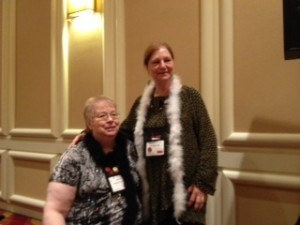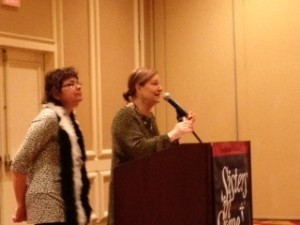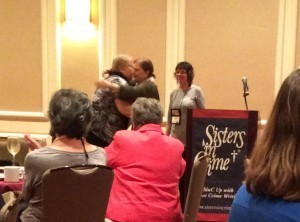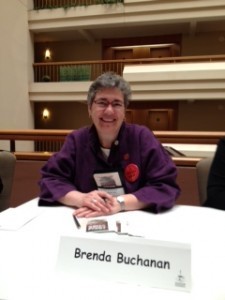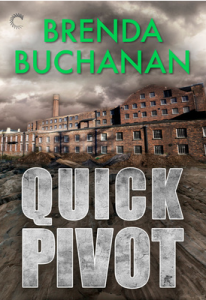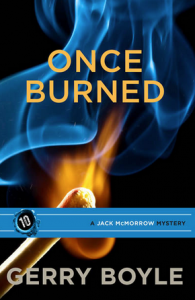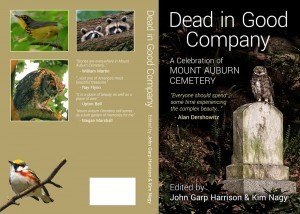Lea Wait's Blog, page 288
May 3, 2015
How Did I Get Here?
You may find yourself living in a shotgun shack And you may find yourself in another part of the world And you may find yourself behind the wheel of a large automobile And you may find yourself in a beautiful house, with a beautiful wife And you may ask yourself-Well…How did I get here? – The Talking Heads, Once in a Lifetime
I am 57 years old, and my debut novel, Quick Pivot, was released last Monday.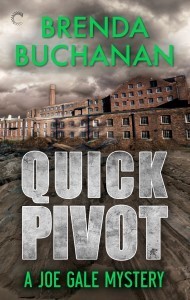
I started imagining this scenario—being a published mystery author—at about the age of ten, when I faced up to the fact that being a cowgirl wasn’t a viable career plan for someone raised in a Massachusetts mill town. I moved a small table and chair into the bedroom I shared with my sister and claimed it as my writing space. I am sure I was insufferable about needing time to create. I no longer have any of the stories I wrote at that little table, which is an excellent thing.
A couple of years later I appropriated my mother’s stand up Underwood and set up shop in the basement playroom, where my hunt-and-peck style was less audible to the rest of the family. After passing through the requisite bad poetry stage, I circled back to crime stories, inspired by the amateur and professional detectives in the mysteries I read constantly.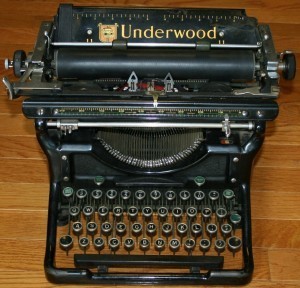
The moment I got to high school I joined the school paper, and eventually became its editor. I went on to study journalism at Northeastern University in Boston, spending my co-op terms at the Boston Globe, but during my academic semesters I managed to sneak in some courses in writing fiction. In one of those truth-is-stranger experiences, my writing prof was Robert B. Parker, who was a few books into his Spenser series and still teaching on the side. I was 20 years old, and my work reflected my limited life experience. But Parker offered feedback and enough encouragement for me to stick into my back pocket the idea that I was capable of writing a publishable novel.
After a number of years working as a newspaper reporter, I went to law school, and have practiced that profession for the past 25 years. For reasons I cannot quite explain, about seven years ago the characters in my Joe Gale Mystery Series began creeping into my consciousness. When their voices grew insistent I realized if I were ever going to write fiction in a serious way, it was then or never.
I took some classes. I read a few books. I began going to Crime Bake every fall and took copious notes during the workshops on character, tension and voice. Some friends and I formed a critique group. I gave myself a two-pages-a-night goal. Two pages a night is 15 pages a week, rounding up. That added up to 60 pages a month, I told myself, which would translate to a novel-length manuscript in about six months.
Of course, it didn’t work out that way. It took years for the first manuscript to be written, many months for me to realize it was far from ready for prime time, maybe a year and a half to write the second book. That one became Quick Pivot, with enormous help from thoughtful beta readers, many kind colleagues who bucked me up when I felt discouraged, and an incredibly supportive spouse.
Now I’m finally moving into the world of published writers. I know the work ahead makes the work I’ve already done seem like zippo. But I’m not mystified about how I got here. It was always my destination. I simply took a circuitous route.
Brenda Buchanan is a former newspaper reporter with a deep reverence for small town journalism. Her Joe Gale Mystery Series features an old-school reporter with modern media savvy who covers the Maine crime beat. Brenda holds a journalism degree from Northeastern University and a law degree from the University of Maine. She writes and practices law in Portland, where she lives with her spouse.
Brenda can be found on the web at www.brendabuchananwrites.com and on Twitter at @buchananbrenda
Quick Pivot is available in digital format wherever fine ebooks are sold.
Here’s a plot summary: In 1968, a cunning thief skimmed a half a million dollars from the textile mill that was the beating heart of Riverside, Maine. Sharp-eyed accountant George Desmond discovered the discrepancy, but was killed before he could report it. After stashing the body, the thief-turned-killer manipulated evidence to make it appear Desmond skipped town with the stolen money, ruining his good name forever.
In 2014, veteran journalist Joe Gale is covering a story for the Portland Daily Chronicle when a skeleton falls at his feet: Desmond’s bones have been found a basement crawl space at the long-shuttered mill. For Joe, digging into the past means retracing the steps his mentor Paulie Finnegan had taken years ago, when the case was still open. But the same people who bird-dogged Paulie four decades ago are watching Joe now. As he closes in on the truth, his every move is tracked, and the murderer proves more than willing to kill again.
May 1, 2015
Weekend Update and News from Malice Domestic
Many of us are in Bethesda, Maryland this weekend for the Malice Domestic conference, a mystery conference that celebrates the cozy mystery. We hope to provide updates and photos of your favorite writers. In the meantime, here’s the blog line-up for this coming week:
Monday, Brenda Buchanan, Tuesday, John Clark, Wednesday, Gerry Boyle, Thursday, Kathy Lynn Emerson/Kaitlyn Dunnett, Friday, Vaughn Hardacker
And while poor Barbara Ross is laid up with a bad knee and unable to celebrate this week’s debut of Musseled Out with us here at the conference, Dorothy Cannell has been busy being made an honorary member of the Guppies (the sisters in crime on-line group of the great unpublished) and giving out the first annual Dorothy Cannell scholarship donated by her wonderful agent, Meg Ruley, to allow someone to attend this great fan conference for free. Photos below are Dorothy getting invested with her guppy feather boa (de rigueur for Guppies) and giving out the scholarship. And Brenda Buchanan at her first ever book signing:
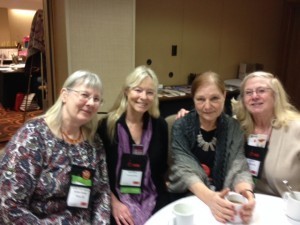
Kathy, Kate, Dorothy and Lea at Malice Domestic in Bethesda
tall milfs cougars that crave black cocks
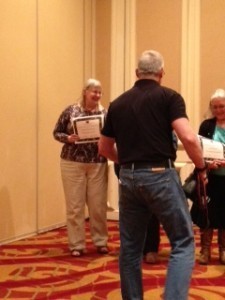
Photographer looks like he is attacking Kaitlyn Dunnett after she gets her nominee certificate
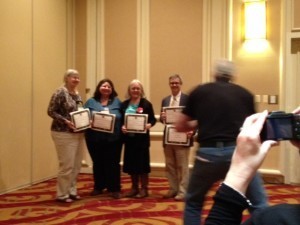
Kathy Lynn Emerson, Barb Goffman, Edith Maxwell and Art Taylor, Agatha short story nominees
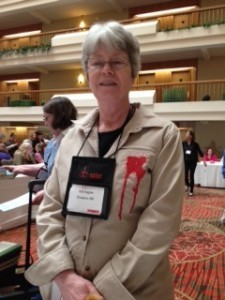
Her daughter gave her this shirt! Can you see that this is a true mystery lover?
Brenda and Gerry will be talking more about their new books, launching this week, but here are their gorgeous covers. You DON’T WANT TO MISS THESE READS!!
April 30, 2015
Bulletin from Writer’s Camp
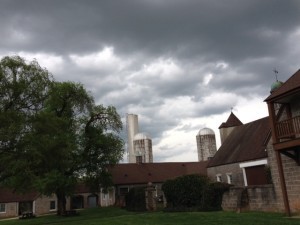
Kate Flora here, writing from a cinderblock studio on a hilltop in rural Virginia. For two glorious weeks, I am in the writing chair at least ten hours a day, my only job to write, and write, and write. As you read this, I’ll be in my car, driving up to Bethesda, Maryland and the Malice Domestic conference. But for a few more glorious days, I’ll be in my writing studio at the Virginia Center for the Creative Arts, surrounded by composers and artists and other writers, breathing the rarified air of creativity.
Although I believe my job here is to be open to whatever stories want to come, my plan was to buckle down and finish a first draft of my next Joe Burgess book, And Led Them Thus Astray. I arrived with about 37,000 words. I will leave with a finished book at 94,000 words. If I was lucky enough to get the book done, I wanted to try and write a short story about my character, Gracie Christian, to submit to the Level Best Books crime story anthology. That story is now done and printed out, ready for a trip to the post office.
When we gather at breakfast and dinner here, fellows frequently talk about what is so special about 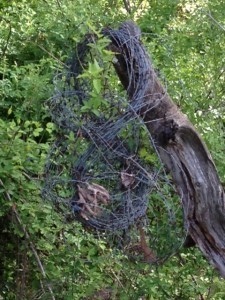 this experience–the uninterrupted working time. Most of us who are writers have a writing practice, but our days are punctuated by the other routines of life–jobs, meal prep, bill paying, gardening, teaching, editing, speaking, interacting with family and others. Here it can be all about the work. All day, and even all night if the story is calling. I call it glorious obsession. My first time here, I had ten days and I wrote 167 pages of a story I’d never had time for. Two nights ago, stuck on a scene that just wouldn’t write, I suddenly had a breakthough, a character started talking, and I sat, grinning with delight, for two hours while the story unfolded.
this experience–the uninterrupted working time. Most of us who are writers have a writing practice, but our days are punctuated by the other routines of life–jobs, meal prep, bill paying, gardening, teaching, editing, speaking, interacting with family and others. Here it can be all about the work. All day, and even all night if the story is calling. I call it glorious obsession. My first time here, I had ten days and I wrote 167 pages of a story I’d never had time for. Two nights ago, stuck on a scene that just wouldn’t write, I suddenly had a breakthough, a character started talking, and I sat, grinning with delight, for two hours while the story unfolded.
Going to open studies and seeing what the artists are doing, listening to composers share their new works, and going to author’s readings–all are optional, but it’s an option most residents choose, because being exposed to new ways of seeing, and new ideas about process, is something that can change our own thinking, open our minds to new ideas, and sometimes just be inspiring because someone has taken something very ordinary and made it extraordinary. The experience of being here, we all agree, is such a gift. If only we could bottle it and bring it home.
Yet it will come home, in the fabulous one-liners over breakfast, in the way that we see and hear color and music intertwined. In the way a lifetime of reading is translated to very personal library cards. In the way other fellows remind that process, as well as product, is important.
So I’m only taking a small break here to write this, because the work is calling me back. But I wanted to share two new books that I have had a part in, that will be appearing in the months to come.
First is a book called Dead in Good Company, a collection of essays about Mount Auburn Cemetery in Cambridge, Massachusetts that is the brain-child of John Garp Harrison. I am honored that title of the essay I submitted has been chosen as the title for the collection. Here’s a link to a radio program discussing the book.
Second, and on a far lighter note, is a group novel produced by my other blog group, Thalia Press Authors’ Co-op, (Views from the Muse) by our fictitious author, Thalia Filbert. Here’s that cover, and some draft cover copy. For those curious about our cover fonts, we’ve used bacon, black pasta, and hot peppers. We’re aiming for a September debut.
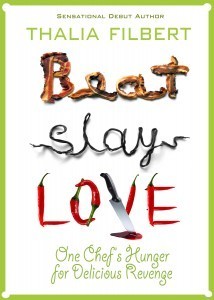 Like your barbeque and sex spicy? Your murders saucy and well done? Lobster and bad guys boiled red hot and served with lemon and butter? Welcome to the fascinating and competitive world of celebrity chefs and food culture, in a wry, witty crime story where cutting edge takes on a new meaning when the chefs start dying.
Like your barbeque and sex spicy? Your murders saucy and well done? Lobster and bad guys boiled red hot and served with lemon and butter? Welcome to the fascinating and competitive world of celebrity chefs and food culture, in a wry, witty crime story where cutting edge takes on a new meaning when the chefs start dying.
Aspiring chef Anna Wendt has a multitude of talents–facility in the kitchen, in the bedroom, and, she discovers, for disposing of bothersome chefs. An adept sous chef and gifted food stylist, Anna would have worked her way up to become a head chef somewhere trendy, and her talents would have blossomed. But wronged by those who steal her recipes, ridicule her weight, and denigrate her talents, Anna turns her imagination and culinary savvy to satisfying her hunger for revenge.
The first time she exacts fatal recompense, she’s surprised at how easy is to stage a fabulous tableau, and at the peculiar excitement that killing brings. Hooked on how tasty revenge can be, she begins bumping off famous chefs in spectacular, cooking-related ways.
Anna is on a roll until chubby, nerdy food blogger Jason Bainbridge, looking for his big break, begins to see a pattern in the killings. Bainbridge forms an uneasy alliance with cool, bitchy, hard-charging FBI agent Kimberly Douglas as the search goes full throttle for the one who is killing celebrity chefs across America.
As the hunt for Anna closes in, our anti-heroine doubles down in a page-turner food fight that will leave you gasping, laughing, and applauding as it comes to a delicious climax.
Debut author Thalia Filbert’s darkly comic sendup of serial killers, food mysteries, chick lit, and the iconic Eat Pray Love, finds the sweet spot between appetizers and dessert in this rollicking trip from sea to shining sea. From color-themed dinners to Maine lobster pots, from barbeque to huckleberries, this mystery is stuffed to the gills with knives, mayhem, and laughs. Grab a fork and dig in.
ABOUT THE AUTHOR
Thalia Filbert’s lust for food, travel, and a good story is legendary. Now she’s combined it all in one delicious package. Her debut novel, Beat Slay Love, highlights her love of the underdog, American regional food, and that special dish best served cold: revenge. She attended culinary school at a posh Napa Valley academy and did the obligatory stint in European bistro kitchens. Although from a backwoods Midwestern town where she learned to make squirrel, woodchuck, and possum au vin, she escaped in the nick of time, leaving a hungry man at the altar. She’s never looked back. She’d like to thank her muses, veteran crime fiction writers Taffy Cannon, Kate Flora, Lise McClendon, Katy Munger and Gary Phillips, for everything.
 Read this far? Well, here’s this week’s special offer: someone who comments on this post will get a free audible download of my novella, Girls’ Night Out.
Read this far? Well, here’s this week’s special offer: someone who comments on this post will get a free audible download of my novella, Girls’ Night Out.
April 29, 2015
Musseled Out Released!
Hi. Barb here. I’m celebrating the release of Musseled Out by giving away a copy of the book to one lucky commenter.
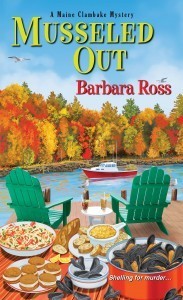 I’m thrilled to announce that Musseled Out, the third book in the Maine Clambake Mystery series, was released today in print and ebook form by Kensington Publishing.
I’m thrilled to announce that Musseled Out, the third book in the Maine Clambake Mystery series, was released today in print and ebook form by Kensington Publishing.
And, Musseled Out will soon be released in audiobook format by Audible.
Here’s the blurb:
The busy summer tourist season is winding down in Busman’s Harbor, Maine, but Julia Snowden senses trouble simmering for the Snowden Family Clambake Company. Shifty David Thwing, the “Mussel King,” is sniffing around town for a new location. When Thwing is found sleeping with the fishes beneath a local lobsterman’s boat, the police quickly finger Julia’s brother-in-law Sonny as the one who cooked up the crime. Julia believes he’s innocent, but proving it won’t be easy. There’s a lot more than murder on the menu, and Julia needs to act fast. . .
You can purchase Musseled Out at your local independent bookstore, at a bricks-and-mortar Barnes & Noble, and at B&N online, Amazon and many other e-retailers.
Reviews
The reviews have been great, which is very gratifying, considering I thought this book was trying to kill me. I handed it in a month late (something I had never done before) and there were times when I thought it would never come together. But then it did. (I think I’ve just described the writer’s life in a nutshell.)
☆☆☆☆½ The latest trip to Busman’s Harbor is a lobster pot full of secrets and deceit. This cozy series continues to stand out with its exceptional plotting, intriguing storylines and authentic detailing of the lobstering life.
RT Book Reviews, May 2015
Musseled Out, the third of Barbara Ross’ stellar Maine Clambake Mysteries, is a craftily plotted, brilliantly paced tale that gives the lie to the notion that all small-town crime is cozy. Addiction, greed, ambition, murder – Musseled Out has them all, plus a bonus lesson in lobstering and a turf war, to boot.
Crimespree Magazine, April 2015
Boasting an eclectic cast of characters, good conversation and a small town feel, this is my favorite book in the series.
Dru’s Book Musings, April 2015
Each book is getting better — and the first one was pretty darned good, so by now, the Maine Clambake series is one of the best amateur sleuth…mystery series coming out of New England.
Kingdom Books, April 2015
Of course, here at Maine Crime Writers, I’ve kept you up to date on the doings with this book right along, so it’s gratifying to see it come full cycle.
Here’s a post I did on the lobstering research.
Gone Lobstering, May 2014
And another with one of the delicious recipes in Mussled Out developed by my husband and partner in crime, Bill Carito.
Slow-Cooker Curried Fish & Butternut Squash Stew, October 2014
Here’s one from when I broke out of book jail.
When I Finish My Book I’m Going To…, July 2014
I have so many people to thank for helping me with this book, but here I’d like to thank my fellow Maine Crime Writers who have made me feel so welcome in the writing community in Maine.
If you’d like to be one of the first on your block to have your very own copy, leave a comment below and one lucky winner will receive the prize.
April 28, 2015
Instant Ancestor
Lea Wait, here. I don’t remember a time I didn’t know about the quest for “instant ancestors.”
Portraits of my real ancestors, on my mother’s side, hung In the home where I grew up: four large portraits of two couples from Edinburgh, painted in the middle of the nineteenth century. I remember my grandmother pointing at one of the women and telling me I’d inherited her blue eyes. Perhaps unlikely, but a connection to the past.
Those people on the walls were part of my history. I didn’t think much about them, to be honest.
But as I grew up I realized that for some people, portraits or, to a lesser extent, photographs, of ancestors were particularly important, perhaps to establish the importance of their forebears. (Poor families didn’t have their portraits painted.) In fact, for a percentage of those people, portraits of ancestors are so important, that, if they don’t inherit any, they buy them. 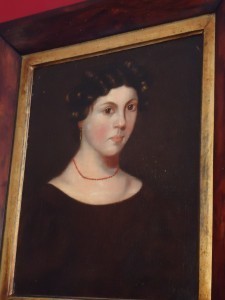
Since I grew up in the antique business, I remember dealers who specialized in paintings joking about their customers looking for to fill their living room or dining room walls with portraits. “Instant ancestors,” the dealers called them — out of hearing of the customers, of course.
There have always been families who were either tired of their family portraits, or had no space for them, or felt they didn’t match a modern décor. So portraits do come on the market.
Most people were looking for attractive white people, fashionably dressed, and painted by, if not a “name” painter, than at least a competent one. (Folk art portraits often are more valuable as art, but not always saleable as relatives.)
From the point of view of the buyers, it didn’t matter who the people were or the artist was. And unsigned paintings, without provenance (the history of the painting and perhaps the subject) are less valuable than those of specific people. So it all worked out.
I never thought much about it.
And then, after my mother died, the portraits that were in her house went to one of my sisters. I had agreed to that. And with a husband who is an artist, and an antique print business, we had plenty of choices of what to hang on our walls.
Then, about ten years ago my husband and I were doing the fall Rhinebeck Antiques Show (the show I fictionalize in Shadows at the Fair). I’d done the show for almost thirty years. I loved the show, and the dealers. But the buyers were changing, and the dealers were retiring. Instead of being one of our best shows of the year, we were barely making expenses. As we sat, hoping for sales, we decided we probably not do the show again.
It was a sad moment.
The dealer across the aisle from us, an older woman from Connecticut, was also saying it might be her last Rhinebeck. She had cancer. As the weekend went by, we talked. And from where we sat in our booth we looked directly at a portrait she’d hung in her booth.
The portrait was of a young woman, not perfectly painted, but distinctive. All the dealer knew was that she’d lived in Connecticut, probably in the first half of the 19th century.
Saturday night I checked the price tag. It was fair, but oo high for us, who were worried about paying our booth rent. I pointed the portrait out to my husband and, to my surprise, he told me he’d been fascinated by it all weekend, too.
Sunday afternoon before packing out I admired it once more. And the dealer said, “I’ll give you a good price. I need to move some inventory. And you don’t have to pay me everything now.”
A quick consultation with my husband and the mysterious woman ended up in our van, headed for Maine. It was an impulse buy. We paid for her over the next few months.
And now she hangs over our dining room fireplace. People often ask, “Is she a relative?”
And we answer, “No. She’s a friend.”
Someday I may put her in a book. But, in addition to the mystery of who she is, she brings with her memories of all my years at the Rhinebeck Antique Show. And, at least for our lifetimes, she’s found a new family.
On the Trail of a Story
Vicki Doudera here, in the throes of finishing a short crime story.
Well – kind of – because right now I’m writing this blog, and yesterday I had to put in several hours at my “other” job as a real estate agent… and yet, I am finishing a short story.
Many people ask me how I hold down a full-time job, as well as a new part-time one as a co-host of a talk show on a new television network here in the midcoast. (www.vstv.me if you are interested – and my show is called “Soup du Jour”) and yet still manage to get writing done.
The answer is: it isn’t easy.
I do it by making a conscious effort to get myself in my office as often as I can to physically write, and then, when I am not in my office, I make a conscious effort to work on my story in my head. It’s not writing, but it’s close. It’s figuring out the details. Playing around with the big picture. Giving my brain the freedom to ramble with an idea.
I do this while I am driving to appointments, or walking to work. I ask myself how I’ll solve a particular plot point, and then, while my feet pound the pavement, I let my mind roam. Some of the ideas are gold – some are just steps along the way. But all of them help as I navigate the elusive trail we call fiction.
Would I love to have the whole day to do nearly nothing but write? Sometimes I long for that, and then I remember that I lived that lifestyle thirteen years ago, before I went into real estate. And although I had a good chunk of time everyday to work on the magazine articles I was writing at the time, I can’t say that I used the time very efficiently. In fact, I would say looking back that I squandered much of it!
Not that it matters, because it’s in the past, and my present now includes commitments in addition to my writing assignments: jobs, volunteer posts, hobbies. At times I do feel like a juggler. Sometimes I’m a very agile one, and sometimes it seems I’m dropping lots of balls. Back in March I let a few fall to the floor, including posting for this blog. Please forgive me, gentle readers.
If there is any upside to my fragmentation, it’s this: when I do sit down at my desk to write, I breathe a happy sigh and feel a sense of bliss. Finishing a short story is not my chore, but my privilege.
And so I will chip away and get it done. Meanwhile…. sending creative thoughts your way as we approach the month of May!
April 26, 2015
Sometime or Dorothy Cannell Considers Reform
Dorothy Cannell: This coming Thursday morning my husband and I will be setting off on a drive to Washington, D.C.; well, a little disagreement regarding the day. I claim that a 4 a.m. departure makes it Wednesday night. That’s what procrastinators (of which I am a pitiful case) do – waste crucial seconds splitting hairs. Actually I prefer the term shilly-shallier because it doesn’t sound so clinical. Whatever! I should be reveling in anticipation of departure because we will be attending that wonderful annual mystery conference Malice Domestic; but I have done it to myself again – put time to the gallop while I’m still desperately trying to get done what should have been accomplish days, weeks, months, years ago.
I wrote in last month’s blog that I was working on a short story. This was true. I endeavor not to lie outside of fiction and I did have two paragraphs completed. It was a plot I’d had in mind for going on half a century and should have been a snap. But then I began agonizing over whether I should employ a double twist at the end and spent several weeks mooning around the house debating the issue – because it would have turned my protagonist into a murderer in addition to the one I already had lined up for the job.
Then came the cowardly thought – why not set this story aside and do one based on another plot I’d  toyed with back in the dark ages. A nudge in this direction came from noting that Down the Garden Path has been selling well as an e-book. It featured the flowers sisters, Misses Hyacinth and Primrose Tramwell, ladies in their sixties who had a penchant for cheating at cards for financial gain in the interest of keeping the roof of their ancestral home over their heads before turning to detection. I would have loved to write more books about them but my publisher preferred I focus on the Ellie Haskell series that began with The Thin Woman. Some fuzzy time back I did do one short story about the flower sisters as I think of them and it now occurred to me that that here was a plot ideally suited to their personalities.
toyed with back in the dark ages. A nudge in this direction came from noting that Down the Garden Path has been selling well as an e-book. It featured the flowers sisters, Misses Hyacinth and Primrose Tramwell, ladies in their sixties who had a penchant for cheating at cards for financial gain in the interest of keeping the roof of their ancestral home over their heads before turning to detection. I would have loved to write more books about them but my publisher preferred I focus on the Ellie Haskell series that began with The Thin Woman. Some fuzzy time back I did do one short story about the flower sisters as I think of them and it now occurred to me that that here was a plot ideally suited to their personalities.
But did I sit write down and bang it out? Of course not! More mooning occurred, but of the twitchy sort because submissions for publication must be received by April 3Oth. Then when I did slither down at the computer I decided I could save time in describing Hyacinth and Primrose by looking up what I said of their physical appearance, mannerisms and speech patters by searching through Down the Garden Path. And then it seemed incumbent to brush up on how I’d portrayed Cloisters, their home, in the village of … something. This turned out to be Flaxy Meade. And I prolonged my coffee break thinking how charming that name sounded. Then insidiously the question crept in as to whether it was plagiarism to crop sentences from one’s own work. I thought about presenting this legal concern to my retired lawyer husband. But would he
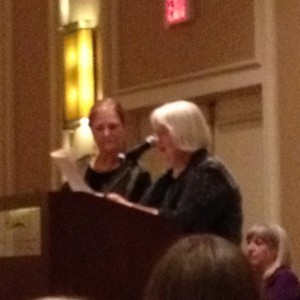
Dorothy Cannell and Margaret Maron at the Mabanquet
expect a fee which I would be obligated to disclose to the I.R.S.? Also a wife can be limitedly demanding and I needed him as my go-to authority on the game of bridge, seeing the story opens with one and all I know on the subject is that it involves cards, some red, some black.
On a positive note the Post Office has this glorious thing – overnight delivery. But anxiety still hovers. I’ll have to pack, which means searching through the closet that I’ve been thinking about organizing for – well let’s not say how long – for clothing suitable for the light of day, let alone going on a trip. Shoes are the biggest problem, most being singles because their partners, having grown fed up with neglect, have run away.
I’m going to reform. Or at least I’m thinking about it, while wondering if I shouldn’t have written the story I first thought about. Oh, well! Another day, another week, another month …
April 24, 2015
Weekend Update: April 25-26, 2015
 Next week at Maine Crime Writers there will be posts by Dorothy Cannell (Monday), Vicki Doudera (Tuesday), Lea Wait (Wednesday), Barb Ross (Thursday), and Kate Flora (Friday). And next weekend (May 2 and 3) many of us will be at Malice Domestic in Bethesda, Maryland. We hope to be able to post news and updates from there.
Next week at Maine Crime Writers there will be posts by Dorothy Cannell (Monday), Vicki Doudera (Tuesday), Lea Wait (Wednesday), Barb Ross (Thursday), and Kate Flora (Friday). And next weekend (May 2 and 3) many of us will be at Malice Domestic in Bethesda, Maryland. We hope to be able to post news and updates from there.
WINNERS! WE HAVE WINNERS!
The ever-clever Kate Flora actually acquired three pairs of library socks. We tossed the names of everyone who posted a comment during library week into a hat and randomly selected three to receive this unique prize. Congratulations to Bonnie Finn, Heather Greene, and Anne Mosey.
In the news department, here’s what’s happening with some of us who blog regularly at Maine Crime Writers:
Lea Wait: This weekend I’m in Springfield, Massachusetts, for the New England Society of Children’s Book Writers and Illustrators conference. For anyone attending, I’ll be at a mentor table Friday afternoon from 4 until 4:30, signing books Saturday, and running two workshops Sunday: one on incorporating real people into historical fiction, and one on editing. Hope to see some friends there!
The next Tuesday, April 28, I’ll be speaking at the Camden-Rockport Elementary School about my Seaward Born, and then running two writing workshops for fourth graders there. And – as pointed out above – Thursday I’ll be heading to Bethesda, Maryland, for Malice Domestic. Excited that three Maine Crime Writers are Agatha nominees this year — Kate Flora, Kathy Lynn Emerson, and me! No matter who wins .. that guarantees a great weekend.
Skidompha Public Library with Dorothy Cannell, Kate Flora, and Barb Ross: If you missed being there in person back on March 26th, never fear, you can hear three talented mystery writers talk about their craft by clicking on the link below.
Enjoy!
Only a few more days until Brenda Buchanan’s book debut:
Brenda Buchanan’s debut mystery, Quick Pivot, launches on Monday, April 27! Moving back and forth between 1968 and the present day, Quick Pivot features a contemporary Maine newspaper reporter who draws on his late mentor’s lessons to solve a 1968 murder, and becomes a target himself when his investigation threatens to expose long-held secrets. It’s the first in a series about Joe Gale, a contemporary reporter with old-school style who covers the Maine crime beat. Quick Pivot is available in digital format wherever ebooks are sold.
On the Falmouth (Mass) Public Library blog this week, it’s shelf talk with Kate Flora. Childhood favorites, author influences, what I’m reading: http://www.falmouthpubliclibrary.org/?/blog/entries/shelf-talk-with-kate-flora/
On another note, since we are about “All things Maine” and in case you’ve missed it, the Bangor Daily News’s Seth Koenig now does a great daily update called Greater Portland Lunch Break with food, events, and news. A perfect bite-sized bit of information. You can subscribe here: http://www.tinyletter.com/GreaterPortlandLunchRush
Want us to give away more of those socks? Maybe a Liberty Graphics tee shirt? Do you like give-aways? Because we do, so read our weekend updates and see what you might win.
An invitation to readers of this blog: Do you have news relating to Maine, Crime, or Writing? We’d love to hear from you. Just comment below to share. Don’t forget that comments are entered for a chance to win books and sometimes very special moose and lobster cookie cutters.
And a reminder: If your library, school, or organization is looking for a speaker, we are often available to talk about the writing process, research, where we get our ideas, and other mysteries of the business. Contact Kate Flora: mailto: kateflora@gmail.com
April 23, 2015
1001 Uses For A Bread Tab, Or Not.
Al Lamanda here.
A friend of mine is a high school English teacher and he recently asked me to speak with some of his students that were bitten by the writing bug. Always happy to help a friend (a free lunch was involved) I went to talk to the hopeful next generation of authors. There was a total of thirteen (right there a bad start) in the group. Six guys, six gals and one I’m still not sure about.
So after my friend made the introduction we chatted a bit about my writing and I threw the floor open to questions. It kind of went like this.
Girl. “Can you tell us some of your secrets?”
Me. “If I told you they wouldn’t be secrets anymore, now would they?”
Girl. “Okay, maybe not secrets, but helpful tips.”
Me. “Buy low and sell high and never invest more than you can afford. Also, never discuss religion or politics with family at a holiday dinner table. It won’t end well.”
The I’m still not sure about person thought that was funny and burst into hysterical cackle while my teacher friend wore a look of sheer terror on his face.
Girl. “I mean tips on writing.”
Me. “Write a lot. All the time. Every spare moment, write. Write about anything you want. Writing is like anything else in life, you have to practice to get good at it.”
The girl gave way to one of the guys.
Guy. “Can you share some of what you’re leaned?”
Me. “Sure. Those little tabs that come with a loaf of bread, you know, the little square things, they are excellent for keeping your place on a roll of duct tape. Also, if you drive an older car and the headlights get yellow; don’t waste money on those treatments you see advertised on TV. Regular old toothpaste and a rag work just as well. Try it, you’ll see.”
Guy. “What does that have to do with writing?”
Me. “You never know. Also, you can rub a walnut on scratched furniture to cover the marks, and those bread tabs I mentioned are great for labeling all those wires behind your computer.”
Guy. “I’m confused.”
Me. “Join the club. It only gets worse over time.”
The guy sat and another girl had a question.
Girl. “When you said a walnut, do you mean a real walnut?”
Mr. “Yup. Another thing you should learn is that if you rip off a really long piece of dental floss, it’s perfect for slicing a cake into perfect triangles.”
Girl. “Really?”
Me. Yup. Cheese, too.”
Girl. “I love cheese.”
Me. “Hey, who doesn’t?”
The girl gave way to another boy in the group. He was a bit on the angry side.
Boy. “How about telling us something useful?”
Me. “I notice that your shirt is pretty wrinkled. If you toss it in the drier for five minutes with a few ice cubes you won’t need to iron it.”
Girl. “I hate ironing.”
Me. “Who doesn’t? Also you can light an uncooked strand of spaghetti and use it to light jarred candles without burning your fingers.”
Boy. “I mean something useful about my writing.”
Me. “What do you write?”
Boy. “Science fiction.”
Me. “What was your last grade in science class?”
The boy turned a shade of red and didn’t answer my question.
Girl. “I like that ice cube in the drier thing, anymore useful things like that?”
Me. “This summer, when you have that backyard barbeque, use a muffin tin to serve the condiments. They’ll all be in once easy to pass around place and cut down on washing dishes.”
The science fiction boy, visibly upset, wagged a finger at me.
My friend the teacher was looking out the window now and humming softly.
Boy. “I stayed after school to talk about writing, not muffin tins.”
Me. “And we are. You look like you play sports.”
Boy. “Football.”
Me. “So you have a lot of sore muscles and bruises. If you wet a sponge, put it in a zip lock baggie and freeze it, you’ll have a perfect ice pack that will never leak when you use it.”
Boy “Really?”
Me. “Yup.”
Boy. “Okay, great, but can we please talk about writing now?”
Me. “Ah, but we are. You see I’m not trying to give you a hard time or sound like the helpful advice guy in the newspaper, but I do have a point to make. And that is to learn as much as you can about everything because you never know when you’ll use something you’ve learned in a story. Your hero or villain is trapped and has only a soda can pull tab as a weapon kind of thing. You like to write science fiction, but you failed science class. Even though it’s fiction, the science has to be grounded in reality or your story will sound false to a reader and it won’t get read.”
I saw a light bulb click on over science fiction boy’s head.
Me. “If you want to write a mystery, but no nothing about solving a crime then talk to the police about how crimes are solved. If your hero is a firefighter, how much do you know about fire and fighting one? Point is to learn as much as possible as it pertains to what you want to write about and you won’t hit a false note.”
Girl. “You’re saying we should write about what we know?”
Me. “What you know about your subject matter comes across in your writing. Before you write your story, do your homework and research on the subject matter so you have a sense of realism to your words.”
The group, even the I’m not sure kid was paying attention now.
Me. “Who is up for a little writing experiment?”
All in the group were.
Me. “Let’s try this. Each of you pick a topic you know nothing about and write a one thousand word short story. Don’t do any research, just write from the heart. Put it in an envelope and seal it. Mark it draft one. Then spend a few days researching the same topic and write a second draft using your newfound knowledge. Mark it draft two. We can meet again in a week and you can read your two stories and we’ll compare which one is better.”
All in the group happily agreed.
And as my teacher friend and I went to enjoy my free lunch, he asked, “That ice cubes in the drier thing really work?”
“Would I say something without researching it first?” I assured him.
Al Lamanda’s new mystery novel This Side of Midnight hits stores and will be available on line this July.
April 22, 2015
Willing Suspension of Disbelief
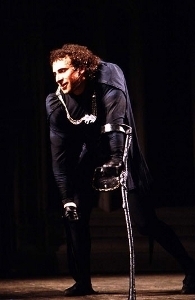 Kaitlyn Dunnett/Kathy Lynn Emerson here. The phrase “willing suspension of disbelief” was one I learned in college literature classes as a necessity if one was to enjoy fiction. I’ve been thinking about that lately. Certainly many classics, from Shakespeare’s Richard the Third to Sir Walter Scott’s Ivanhoe are far from historically accurate, but that never stopped readers from enjoying them. Why, then, is there so much emphasis on getting the details right when it comes to writing fiction today?
Kaitlyn Dunnett/Kathy Lynn Emerson here. The phrase “willing suspension of disbelief” was one I learned in college literature classes as a necessity if one was to enjoy fiction. I’ve been thinking about that lately. Certainly many classics, from Shakespeare’s Richard the Third to Sir Walter Scott’s Ivanhoe are far from historically accurate, but that never stopped readers from enjoying them. Why, then, is there so much emphasis on getting the details right when it comes to writing fiction today?
Yes, I’m playing devil’s advocate. I do think writers owe it to their readers to do their homework and avoid the most horrendous bloopers. On the other hand, there’s no way any writer can get every single nit-picky detail exactly right, especially if they write historical fiction. And for all writers, typos and continuity errors are bound to slip past even the most skilled proofreader. Yes, okay, a character put on a sports coat on page six and it somehow turned into a down jacket on page forty. Or maybe a character is called by the wrong name. It happens. A modern equivalent of the “willing suspension of disbelief” advice might be “don’t sweat the small stuff,” to which many would add “it’s all small stuff.”
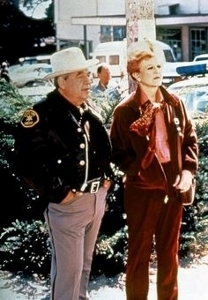 When I read for pleasure, I have difficulty doing this with historical mysteries set in the sixteenth century, a period I know far too well. Getting British forms of address wrong will pull me out of a story, no matter what century it is set in. I also find it jarring when certain forensic details—the smell of cordite; dead bodies continuing to bleed; calling what would probably be a constable in a small town a sheriff—pop up. But overall, I find I am much more forgiving than I once was.
When I read for pleasure, I have difficulty doing this with historical mysteries set in the sixteenth century, a period I know far too well. Getting British forms of address wrong will pull me out of a story, no matter what century it is set in. I also find it jarring when certain forensic details—the smell of cordite; dead bodies continuing to bleed; calling what would probably be a constable in a small town a sheriff—pop up. But overall, I find I am much more forgiving than I once was.
 In my own historical novels, where once I used contractions like ’tis and avoided it’s like the plague, I’ve learned to relax. No one really cares that it’s, don’t, doesn’t, and other contractions weren’t yet in use in England in fifteen-whatever. As for other anachronisms, by all means avoid those that come from someone’s name (like mesmerize, from Franz Mesmer, who lived from 1734-1815) but if you write a novel about Chaucer, you’re not going to write it in Chaucer’s English. Very few people would be able to read it. A novel set in France or Spain is essentially “translated” into modern English. Why not use the same logic with one set in the past in England or America?
In my own historical novels, where once I used contractions like ’tis and avoided it’s like the plague, I’ve learned to relax. No one really cares that it’s, don’t, doesn’t, and other contractions weren’t yet in use in England in fifteen-whatever. As for other anachronisms, by all means avoid those that come from someone’s name (like mesmerize, from Franz Mesmer, who lived from 1734-1815) but if you write a novel about Chaucer, you’re not going to write it in Chaucer’s English. Very few people would be able to read it. A novel set in France or Spain is essentially “translated” into modern English. Why not use the same logic with one set in the past in England or America?
 A well-written novel that tells an engaging story can make me overlook a great many minor flaws. I can forgive a lot if I’m caught up in the plot. If the author’s voice is powerful enough to keep my eyes glued to the page, I barely notice any errors that slip in. That’s true for fiction set in the past and the present, and also for paranormal, urban fantasy, and futuristic novels, too. Far more important is whether the characters and their actions are believable.
A well-written novel that tells an engaging story can make me overlook a great many minor flaws. I can forgive a lot if I’m caught up in the plot. If the author’s voice is powerful enough to keep my eyes glued to the page, I barely notice any errors that slip in. That’s true for fiction set in the past and the present, and also for paranormal, urban fantasy, and futuristic novels, too. Far more important is whether the characters and their actions are believable.
So, what do you think, fellow readers? How much are you willing to forgive if the story and characters are strong enough to make you want to keep reading?
Lea Wait's Blog
- Lea Wait's profile
- 506 followers


